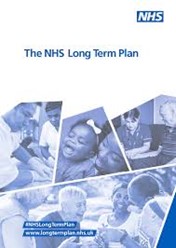The NHS 10 year plan: is it enough?
 On 7 January, the NHS released their 10 year plan, outlining their key objectives for the coming years. It states that one of their priorities is to improve access to NHS services for people with a learning disability, autism or both. This comes following the Learning Disabilities Mortality Review (LeDeR), which has highlighted huge inequalities in care for this group.
On 7 January, the NHS released their 10 year plan, outlining their key objectives for the coming years. It states that one of their priorities is to improve access to NHS services for people with a learning disability, autism or both. This comes following the Learning Disabilities Mortality Review (LeDeR), which has highlighted huge inequalities in care for this group.
The plan recognises:
- There is inequality in the provision of medical care for people with a learning disability and/or autism.
- Children and families are waiting too long for a diagnosis of a learning disability and/or autism.
The plan outlines a commitment to:
- Providing better support to people with a learning disability and/or autism.
- Continuing to fund LeDeR, the Mortality Review, which aims to reduce preventable deaths of people with a learning disability and/or autism.
- Expanding STOMP – a programme to stop over medication of people with a learning disability and/or autism.
- Providing NHS staff with valuable information and training on supporting people with a learning disability and/or autism.
- More partnership working (e.g. with DfE), with the aim of making an earlier learning disability or autism diagnosis and providing better community support.
- Offering more opportunities for people with a learning disability and/or autism in the form of internships, leading to paid employment.
 We welcome the plan’s focus on improving the lives of people with a learning disability, autism, or both, particularly its commitment to improve access to healthcare, training for NHS staff and the time taken for an initial diagnosis. However, we echo the concerns expressed by Learning Disability England; in its current form, there is a lack of clarity in how the NHS will deliver on these plans.
We welcome the plan’s focus on improving the lives of people with a learning disability, autism, or both, particularly its commitment to improve access to healthcare, training for NHS staff and the time taken for an initial diagnosis. However, we echo the concerns expressed by Learning Disability England; in its current form, there is a lack of clarity in how the NHS will deliver on these plans.
A primary concern is how the NHS will reduce inpatient provision under the transforming care agenda, given that it has already failed to meet targets in this area, now pushed back by a further five years.
In addition, there is no mention of the Mental Capacity Act and best interest process. Specifically, there’s no detail about how health professionals will seek consent for procedures. Currently, it is reported that there are inconsistencies in how this is being sought and that there are delays in treatment as a result.
There is also no acknowledgement of how a person’s home setting will be considered with regards to the discharge process. Currently some people are being discharged without the resources they need to stay safe, under the assumption that they receive full time care. This means support staff are often expected to provide complex care for individuals in shared accommodation, or for those who have minimal support hours.
In conclusion, this plan highlights that change is necessary. It acknowledges failures, and outlines planned improvements. We now call on the NHS to work in partnership with expert organisations like ours to ensure that these actions are followed through, making much-needed improvements to the lives of thousands of people in the UK.

